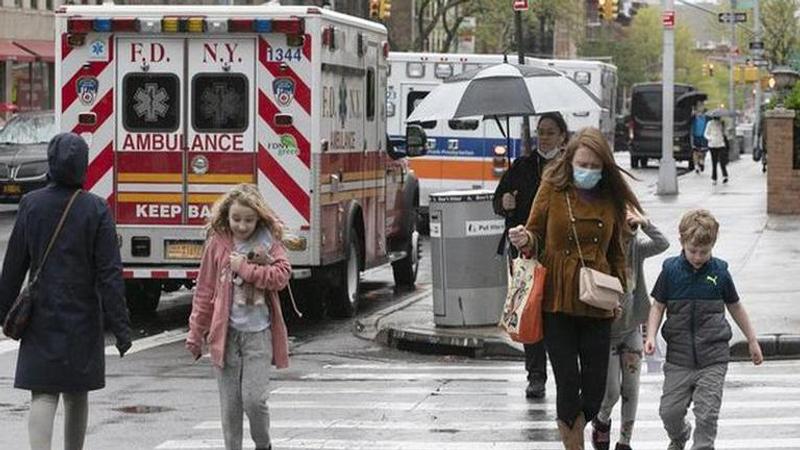Published 12:30 IST, June 29th 2020
Testing stepped up as number of new coronavirus cases surges
Governments were stepping up testing and warily considering their next moves Monday as the number of newly confirmed coronavirus cases surges in many countries. India reported 20,000 new cases Monday, while the U.S. confirmed more than 40,000 new infections for the the third straight day.

Advertisement
Governments were stepping up testing and warily considering their next moves Monday as the number of newly confirmed coronavirus cases surges in many countries. India reported 20,000 new cases Monday, while the U.S. confirmed more than 40,000 new infections for the the third straight day.
As infections rise along with summer temperatures in the northern hemisphere, many governments are stepping up testing and mulling more aggressive moves such as renewed lockdowns to stem fresh outbreaks.
India's 20,000 new infections was a new daily record. Several states reimposed partial or full lockdowns after the total number of cases jumped by nearly 100,000 in one week to 548,318.
While some states have tightened precautions, in the worst-affected regions of Maharashtra, which includes India’s financial capital, Mumbai, and Delhi, home to the federal capital of New Delhi, most restrictions have been eased, with restaurants, shopping malls and parks reopened, and public buses and shared-ride services back on the roads.
The United States, the worst affected country, reported 42,600 newly confirmed infections as of Saturday, with the total surpassing 2.5 million, or about a quarter of all of the more than 10 million confirmed cases worldwide, according to a tally by Johns Hopkins University. Experts say the actual numbers, both in the U.S. and globally, are likely far higher due to the large number of apparently asymptomatic cases and issues with testing.
Beaches were closing and beer was going untapped as Florida, Texas and other states backpedaled on their pandemic reopenings, ordering mandatory use of masks in public places and closing down restaurants and bars in hopes of stemming a resurgence in cases.
Nearly 8.3 million people out of some 21 million have undergone testing in recent weeks in the Chinese capital after an outbreak centered on a wholesale market. The country had 12 new cases Monday, including seven in Beijing, down by more than half from the day before, the National Health Commission reported.
South Korean authorities reported 47 new cases as they struggled to curb outbreaks that have spread from Seoul to other regions.
Widespread testing and contact tracing helped contain South Korea's initial outbreak in which it was finding hundreds of new cases a day in late February and early March. Most of those cases were in the area surrounding city of Daegu, where many were linked to a single church congregation with thousands of members.
Tracing recent transmissions in the Seoul metropolitan area, home to about about half of the country’s 51 million people, has proved to be more difficult.
South Korean health officials have said they are ready to implement stronger social distancing measures -- including banning all gatherings of more than 10 people, shutting schools, halting professional sports, and restricting operations of non-essential businesses — if the daily increase in infections doubles more than two times in a week.
Health authorities are using what they describe as a world-first saliva test for coronavirus in Australia’s second-largest city, Melbourne in the state of Victoria, where the disease is spreading at an alarming rate.
Victorian Health Minister Jenny Mikakos said Monday that 75 people had tested positive in the state in the latest 24 hours, bringing the total number of cases to 2,099.
Brett Sutton, Victoria's chief health officer, said the outbreak could surge out of control as pandemic restrictions ease elsewhere in Australia.
“l think it’s a genuine challenge now. I think we’re right at the edge in terms of being able to manage it,” Sutton said.
In the Philippines, local officials were under fire for allowing a street parade and dance during a weekend religious festival to honor St. John the Baptist despite quarantine prohibitions against public gatherings.
Performers in native wear and face masks danced during the night procession, which drew a large crowd in Basak village on Cebu, in the central Philippines.
The Philippines remains a Southeast Asian coronavirus hotspot with more than 35,000 confirmed infections, including 1,244 deaths. Restrictions have been eased in many places to help salvage the ailing economy, but Cebu resumed a strict lockdown this month after new cases spiked.
Some governments in Asia are pushing ahead with resuming some regional travel between countries where outbreaks of the virus appear to be contained.
But civil aviation authorities in the United Arab Emirates announced they had suspended all flights to Pakistan until a “special laboratory” could be set up to conduct coronavirus tests for people traveling from the country to the UAE.
The UAE’s state-run WAM news agency issued a statement late Sunday from the country’s General Civil Aviation Authority announcing the decision.
Pakistan resumed international travel earlier this month even as its critics said the airport precautions were limited and ineffective. Last week, Pakistani media reported 27 passengers traveling from Pakistan arrived in Hong Kong and tested positive for COVID-19. The passengers had transited through the UAE.
12:30 IST, June 29th 2020




